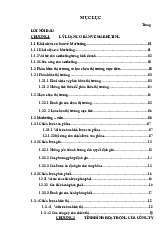






Preview text:
lOMoAR cPSD| 60692662
Juyang (Makalot) Zhou Liping interviews nearly 100 employees every six months, and Ming
Ding’s 58year-old supervisor exits the table
A tea ceremony schedule assists the textile unit to raise a succession team of 100 people in the next
10 years Industry situation| Author: Cai Ruhan | Publication date: 2021-04-29
A photo, announcing the official formation of Juyang (Makalot)'s successor team. They are Song
Peifang from the business marketing group (front row 1 from left), engineering research and
development group Zhou Xinpeng (front row 2 from right), and operation management group Huang
Yuqing (front row 1 from right).
The average age is only 43 years old, and they are all members of the board of directors. (Photographer. Cheng Sidi)
Is succession a matter of "one person" or "a group of people"? As Taiwan's small and medium-sized
enterprises enter the wave of succession, more and more people realize that this can't just be handed
over by the boss alone, but the entire organization must be replaced by generations to last.
The reason is easy to understand, but it is even more difficult to actually do it. However, Juyang
(Makalot) Industrial, a textile stock that is second only to Ruhong in stock price, has invested a full ten years in "succession".
Last year, the textile industry was once impacted by the epidemic, and later reversed the situation in
the third and fourth quarters. Among them, Juyang (Makalot) achieved an annual revenue of nearly
25 billion and an annual growth rate of net profit of nearly 8%, surpassing Ruhong and Guanxing.
Waiting for the performance of its peers, it also brought the stock price to a six-year high. Established: 1990 Chairman: Zhou Liping
Main products: all kinds of ready-to-wear
Transcript: 2020 revenue of 24.9 billion yuan, net profit after tax of 2.08 billion yuan, an annual increase of 7.77%
Status: Behind the textile stocks
Zhou Liping, chairman of Juyang (Makalot), attributed this achievement to a group of young
executives in a media event in March this year. It turned out that as early as last year before the
epidemic, Juyang (Makalot) had successively carried out a generational change of senior executives,
and the young team happened to play in the crisis. Including Zhou Liping's son Zhou Xinpeng who
is in charge of construction, Huang Yuqing who is in charge of operations management, and Song
Peifang who is in charge of the business marketing group. The average age is only 43 years old.
"Talk to them more often. They will soon take over 100% of Juyang (Makalot)'s operations!" Zhou
Liping announced that he will hand over the CEO position to Zhou Xinpeng within three years. This
means that the succession layout is almost complete.
Zhou Liping can't retire at the age of 60...
After learning from the pain, we set a ten-year plan for talent hunting lOMoAR cPSD| 60692662
Usually, just the succession of a son is enough to make the company suffer. How does Juyang
(Makalot) achieve the succession of "a group of people"?
In an exclusive interview with Shang Zhou, Zhou Liping fully disclosed for the first time his ten-year
succession plan. It turned out that the story started on his sixtieth birthday.
"I used to tell the outside world that I would retire when I was around 60 years old. But when the time
came, I found out what happened. I couldn't retire at all, because the team couldn't take over," he
recalled. However, no concrete action has been taken, "If ideas and practices are no longer connected
together, then when I am seventy years old, I still won't be able to deliver!"
After learning from the pain, he convened supervisors at all levels and announced: 1. The handover
plan will be postponed for ten years. 2. Inheritance has since been included in the company's key
tasks. Whether you are a department-level, department-level or higher-level supervisor, if you do not
prepare a successor, your own promotion will stop here.
After the end of Buda, it will be implemented immediately. At that time, the first task he launched
was "performance evaluation grouping", with a clear purpose: to regularly take stock of the talents
and stages of the entire company.
Use the talent 9 grid to find out the future star in the team Review every six months
Classify talents according to performance and adjust organization
How does Juyang (Makalot) assess abstraction potential?
1. The direct supervisor refers to the usual work enthusiasm, accuracy, ambition, etc., and
reports to HR 2. The HR supervisor evaluates the overall ability, and then reports the list of
suggestions to the immediate supervisor
3. Held a talent evaluation meeting, Zhou Liping provided observations during the tea ceremony, and
jointly decided on the promotion list
■Access to the Mentoring Program
▪Under development: outstanding potential, but poor performance, may be newcomers or lack of motivation
▪Poor performance employees: have certain abilities, but may not have adapted to the current position
▪Lacking employees: performance and potential are not up to standard, need to be coached or eliminated
▪Basic Competence: The performance is in line with the current position, but the future development is limited
▪Skilled employees: excellent performance, senior and experienced, but limited potential, stable backbone group
■Access to the executive training program
▪Rising star: mediocre performance, but outstanding potential, may be insufficient motivation or misplaced lOMoAR cPSD| 60692662
▪Backbone: the performance is in line with the current job standards, and it is a stable backbone 2
▪Superstar: High potential and high performance, must constantly challenge the stage and projects,
and is expected to be promoted to level 2 or above
▪Performance star: excellent performance, certain potential, must be continuously stimulated and developed
Semi-annual performance evaluation is the basic evaluation system that most companies will have,
but Juyang (Makalot)'s approach is more detailed. First, select the top 15% to 20% employees (about
150 people) with the best performance based on the two indicators of "current performance" and
"future potential", and then divide them into three groups according to their expected value. For
example, the first group is "It is expected to be more than two grades higher than the current level".
This group of people is the company's key training targets.
Secondly, in response to changes in the industrial environment, organize the organization structure
every six months. For example, the epidemic has prompted the textile industry to receive orders
remotely, and digital marketing has become more important. Should the information department be
upgraded from a "department" to a "department"? This year's revenue is expected to grow by 15%.
Should the business department expand its team and add a few more small managers?
"To put it simply, it is to list the number of positions in the organization, what level of positions, and
which talents to match," Zhou Liping revealed. In the past five years, about ten organizational adjustments have been made.
Finally, a one-on-one interview with him personally. At this point in the conversation, he dug out a
"CEO Tea Talk Form", which was densely packed, listing the employee's name, seniority, rank, post- lOMoAR cPSD| 60692662
promotion rank, and tea talk time. From the Lunar New Year to the end of April, he has interviewed
forty-nine people, with an average of at least four people per week. What's more special is that many
of them are not in charge, and the youngest ones are only between one and two years old.
The seniority is still young, doesn't it mean that the probability of leaving the job is higher, and the
interview may be a white job? "Yes, it happens often!" Zhou Liping said, "But I think this way, if one
of the three can stay in Juyang (Makalot) for a long time, it will be a good deal."
"The essence of succession planning is long-term training," Lin Wenzheng, an associate professor at
the Institute of Human Resource Management of Central University, pointed out. Most foreign
benchmark companies have the so-called Young Talents plan, which is to identify potential talents.
Hundreds of people, it will take another ten years to screen to three to five people.
Juyang (Makalot) also adopts the same strategy, and regroups according to performance every six
months (about 30% of the list will be replaced by new ones), inventory organization, and conduct
one-on-one interviews, which means that the talent pool rolls faster. And this also brings Zhou
Liping's second task - to set a transparent and open retirement schedule for senior employees.
Five years ago, he issued a notice: All employees will be actively assisted in career planning by the
company from the age of 58, relegated to the second line from the age of 60, and formally retired
from the age of 65. The announcement also noted exceptions. For example, it is difficult to train
talents in Southeast Asian factories, and lOMoAR cPSD| 60692662
the two factory supervisors are both over 60 years old and still unable to take over the shift. They will
be dealt with on a case-by-case basis.
Determining the retirement schedule of the senior team
Ask "Who will pick you up if you get promoted" every six months
"I will write it down in black and white. One is to explain it in advance so that they don't suddenly
suffer from unknown situations; the other is to disclose the rules of the game so that everyone will
not feel that they are being targeted," Zhou Liping said. He also admitted frankly that this is the most
difficult part of the whole succession plan, because some people are willing to hand over early, but
some people think they are in good health, why should they step down? If you have to retreat to the
second line after cultivating talents, then why cooperate?
"It must be admitted that there is a human contradiction here, but you have to face it," he smiled wryly.
At this stage, his approach is: carrots and whips coexist.
For example, in the KPI (Key Performance Indicators) of Juyang (Makalot)'s middle and senior
executives, "cultivating talents" accounts for as high as 10% to 15%. They also have to answer a
question every six months: "If you are suddenly promoted, who can take your place?" They must
hand over the first and second names. If you can’t fill it out, leave it blank, but you have to report to
Zhou Liping every three months to discuss the policy of cultivating talents. If you can’t fill it out
again, the discussion will be reduced to once every two months;
For another example, considering that the senior cadres who are over 60 years old hold a lot of Juyang
(Makalot) stocks, in addition to regularly sharing the company's business developments in writing,
Zhou Liping also prepares a "retirement meeting dinner" every year to communicate face-to-face, so
as not to affect these people. Investment planning for old employees after retirement.
With the previous accumulated foundation, last year, Zhou Liping finally ushered in the third step of
the succession plan-starting the "decision-making platform" like a tutoring class, and personally
cultivating the succession echelon that has gone through nine years of evaluation and stood out.
Hold regular successor parties
From staring at each other to discussing timeouts
The 44-year-old Huang Yuqing, the general manager of the Senior Division of the Juyang (Makalot)
Finance and Accounting Management Department, recalled that this platform can be divided into two
stages. In the first stage, there is a meeting every two weeks, and there is no theme, and this group of
people from various departments who usually only work on business will be chatted together. "I'm
not familiar with you at first, so it's really a little awkward. After a one-hour meeting, there will be no
topic after about 30 minutes," she said with a smile.
Zhou Liping participated in the whole party, but he hardly spoke, which was tantamount to forcing
everyone to communicate by themselves and slowly lower their guards. After five or six times, the lOMoAR cPSD| 60692662
second stage was changed to once a week. He set nine major themes, including smart clothing, brand
customer development, and African strategic cooperation. Everyone must claim the topic, and then
take turns serving as the chairperson, responsible for leading the discussion.
"Up to now, the gatherings often go overtime!" Huang Yuqing revealed that Zhou Liping even
deliberately asked everyone to have dinner together, and would also take the initiative to host,
allowing everyone to chat from business affairs, hobbies to watching dramas through meals.
Why does a chairman spend so much time cohesively cohesive team, even meals are carefully included in the schedule?
"Everyone hopes that the decision-making teams have a consensus with each other, but I think that
before there is a consensus, there must be a consensus." Zhou Liping believes that the more things
that resonate, the more they understand each other's style, the smoother the future cooperation will
be, just like the EMBA very The purpose of attaching importance to dinners among classmates is to
establish this kind of "outside business" friendship.
Chen Zhenqian, accountant in charge of the family office of An Hou Jianye United Accounting Firm,
pointed out that Zhou Liping's cultivation strategy is very similar to cultivating a group of partners:
"The most difficult thing among partners is mutual trust, and the premise of mutual trust is mutual understanding."
Father-son break-in and division of responsibilities,
New team leadership a challenge for the future
He said frankly that Juyang (Makalot) can be said to be one of the most delicate and well-structured
succession layouts he has heard, and it is even rare in the field of traditional production, but there are
two major background factors that cannot be ignored.
First of all, its shareholding is very scattered. The top three shareholders are Fubon, Cathay Pacific, and
Nanshan Life Insurance, and the Zhou Liping family holds only about 4% of the shares. In addition,
Juyang (Makalot) was originally started by partners, so it formed a corporate culture of joint decision-
making, joint governance, and professional manager thinking, which is completely different from the
"family world" where most family businesses are dominated by one person.
Secondly, Zhou Liping has only one pair of children, and other partners have also faded out of the
business and only serve as directors. This allows Juyang (Makalot) to avoid the problems of a large
number of secondgeneration families competing to join and insufficient position allocation. "Usually
this is the point where everyone quarrels the longest! They are very lucky to be able to skip the dispute
and start planning for the future," Chen Zhenqian said. lOMoAR cPSD| 60692662
Now, Zhou Liping clearly calls out that the CEO will be handed over to Zhou Xinpeng within three
years. Most of the textile industry and inheritance experts are optimistic, but they also point out the next three challenges: 1.
The division of responsibilities between the chairman and the chief executive officer. These
two positions have been held by Zhou Liping for a long time, but after three years, the father will
make decisions, and the son will be responsible for execution. How will father and son work together?
Once something goes wrong, how is the responsibility assigned? 2.
Without strong leadership, the real performance of the succession echelon. According to the
analysis of a general manager of a large textile factory, Zhou Liping has tried his best to solve the
problems of veterans and opened up a large stage for young people, but there are still some major
problems in the textile industry that need to rely on experience. For example, the business that is
responsible for the needs of brand customers and the factory affairs that are responsible for the
deployment of production, the two big heads will always have different positions, and only the boss
can come forward to settle it. Has the young team established such prestige? 3.
How long will Zhou Liping serve as the chairman after handing over the CEO? For the
company, this is the real succession completion.
Faced with these three questions, Zhou Liping's answer is to wait and see. But before the end of the
interview, he also revealed the main reason why he made up his mind to bring the succession team to
the table—because of the close cooperation of these young executives in business, finance, and
production, this year, Juyang (Makalot)’s order volume is expected to be higher than Last year, it
grew 3.5 million dozen, which is far better than the historical record of 1.5 million dozen he set.
Ten years of planning, and the discipline of insisting on implementation, finally allowed Zhou Liping
to hand over the baton with confidence. "He has done a key that all EMBA and inheritance books
have taught you, but most bosses can't do it: inheritance, do important things first, not urgent things!" Chen Zhenqian concluded.
1. A summary of the case.
2. How is the “inheritance” of the inter-generational succession?
3. What is the making of the succession team?
4. Why are there non-family members in the succession team?
5. In your opinion, how is the mixed bag of the succession team going to ensure a smooth succession, or not?
6. What is the mindset of the predecessor?
7. Compare an inter-generational succession case in your home country with Juyang
(Makalot). Use bullet points to illustrate similar, as well as distinct, practices.



